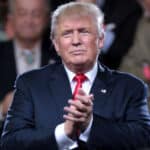



Former President Donald Trump has petitioned a federal court to reevaluate his recent felony conviction in New York, revolving around hush money payments.
AP News reported that Trump's legal team is attempting to shift their client's hush money case from state to federal court to contest the conviction and defer sentencing.
The request to move the case to federal jurisdiction was prompted by what Trump's attorneys describe as constitutional violations during the state court proceedings. They argue that the trial was tainted by local biases which they believe could be mitigated in a federal setting.
This isn't the first time Trump's defense has sought to transfer their case to the federal system. Their previous attempts were unsuccessful, including one denied by the same federal judge now reconsidering the case.
The legal arguments put forth center on a Supreme Court ruling regarding presidential immunity, which Trump's attorneys claim should exempt him from this type of state prosecution.
In May, Trump was convicted on 34 counts of falsifying business records to hide a $130,000 payment to adult film star Stormy Daniels. Trump has consistently denied the underlying affair allegations, asserting the money was a legitimate legal expense.
Trump's lawyers contend that continuing with sentencing could sway the upcoming election, seeing it as an attempt to interfere politically. The timing of the sentencing is particularly contentious as it coincides with the election cycle.
The Manhattan District Attorney's office, which is responsible for the prosecution, has opted not to comment on these latest developments.
Trump's legal team is not only challenging the conviction but also seeking to postpone the sentencing. They argue that a recent Supreme Court decision on presidential immunity should apply, potentially affecting the outcome of their appeal.
The defense also points to perceived biases by the trial judge, whose daughter is a Democratic political consultant, which they argue could influence the case's impartiality.
A further complication is the gag order imposed on Trump, which his lawyers criticized as a violation of his free speech, especially significant during the election season.
U.S. District Judge Alvin K. Hellerstein, who is overseeing the federal request, previously ruled that the payments were personal in nature and unrelated to Trump's official presidential duties.
This distinction is crucial as it addresses the scope of presidential immunity in legal matters occurring outside the official functions of the office.
Trump's legal team, however, insists that new evidence and testimonial developments warrant a reevaluation under federal jurisdiction. This would allow a broader interpretation of presidential actions during Trump's term.
According to Trump's attorneys, Todd Blanche and Emil Bove, the ongoing legal proceedings pose "irreparable harm to President Trump — the leading candidate in the 2024 Presidential election — and voters located far beyond Manhattan."
They argue that the case could imprison Trump during the crucial weeks leading up to the election, effectively silencing his campaign efforts against his opponents.
As the legal battle unfolds, its outcome could have significant repercussions not only on Trump's personal freedom but also on the political landscape leading up to the 2024 presidential election.



